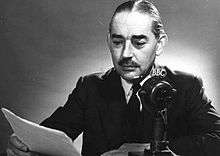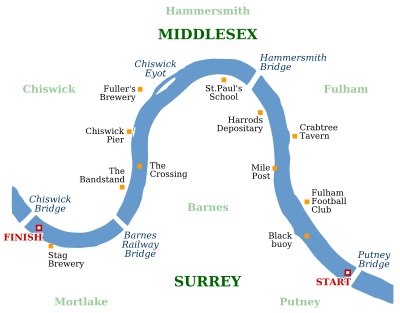The Boat Race 1931
The 83rd Boat Race took place on 21 March 1931. Held annually, the Boat Race is a side-by-side rowing race between crews from the Universities of Oxford and Cambridge along the River Thames. In a race umpired by the former rower John Houghton Gibbon, Cambridge won by two and a half lengths in a time of 19 minutes 26 seconds. The victory took the overall record to 42–40 in their favour. It was the first race for which John Snagge provided a radio commentary for the BBC.
| 83rd Boat Race | |||
|---|---|---|---|
| Date | 21 March 1931 | ||
| Winner | Cambridge | ||
| Margin of victory | 2 1⁄2 lengths | ||
| Winning time | 19 minutes 26 seconds | ||
| Overall record (Cambridge–Oxford) | 42–40 | ||
| Umpire | John Houghton Gibbon (Cambridge) | ||
| |||
Background

The Boat Race is a side-by-side rowing competition between the University of Oxford (sometimes referred to as the "Dark Blues")[1] and the University of Cambridge (sometimes referred to as the "Light Blues").[1] The race was first held in 1829, and since 1845 has taken place on the 4.2-mile (6.8 km) Championship Course on the River Thames in southwest London.[2][3] The rivalry is a major point of honour between the two universities; it is followed throughout the United Kingdom and, as of 2014, broadcast worldwide.[4] Cambridge went into the race as reigning champions, having won the 1930 race by two lengths, and led overall with 41 victories to Oxford's 40 (excluding the "dead heat" of 1877).[5][6]
Cambridge were coached by R. W. M. Arbuthnot (who had rowed for Cambridge four times between 1909 and 1912), J. A. MacNabb (who had rowed in the 1924 race) and P. H. Thomas (a four-time Blue between 1902 and 1905). Oxford's coaches were A. V. Campbell (who took part in the 1922 and 1925 races), Stanley Garton (who had rowed three times between 1909 and 1911) and P. C. Mallam (a Dark Blue from 1921 to 1924 inclusive).[7] The race was umpired by former Cambridge rower John Houghton Gibbon who had participated in the 1899 and 1900 races.[8]
The rowing correspondent for The Times stated that the crews were "well-matched",[9] while The Manchester Guardian's correspondent predicted a "gruelling struggle".[10] It was the first time John Snagge provided a radio commentary for the BBC.[11] He would go on to commentate for the corporation every year up to and including the 1980 race.[12]
Crews
The Cambridge crew weighed an average of 12 st 4.625 lb (78.1 kg), 1.125 pounds (0.5 kg) per rower more than their opponents. Oxford saw three rowers return to their crew with Boat Race experience, including D. E. Tinne who was making his third consecutive appearance. Cambridge's crew included five rowers who had participated in the event prior to this year, including their stroke T. A. Brocklebank who was also rowing for the third year in a row.[13] All of the participants in the race were registered as British.[14]
| Seat | Oxford |
Cambridge | ||||
|---|---|---|---|---|---|---|
| Name | College | Weight | Name | College | Weight | |
| Bow | W. L. Garstang | Trinity | 11 st 2 lb | D. Haig-Thomas | Lady Margaret Boat Club | 11 st 4.5 lb |
| 2 | G. M. L. Smith | Brasenose | 11 st 11 lb | W. A. Prideaux | 3rd Trinity | 12 st 6 lb |
| 3 | D. E. Tinne (P) | University | 12 st 4 lb | R. H. H. Symonds | Lady Margaret Boat Club | 11 st 12.5 lb |
| 4 | C. M. Johnston | Brasenose | 12 st 9 lb | G. Gray | Queens' | 13 st 5 lb |
| 5 | R. A. J. Poole | Brasenose | 13 st 2 lb | P. N. Carpmael | Jesus | 13 st 0 lb |
| 6 | L. Clive | Christ Church | 13 st 2.5 lb | H. R. N. Rickett | 3rd Trinity | 12 st 10 lb |
| 7 | W. D. C. Erskine-Crum | Christ Church | 12 st 1.5 lb | C. J. S. Sergel | Clare | 12 st 7 lb |
| Stroke | R. W. G. Holdsworth | Brasenose | 11 st 10.5 lb | T. A. Brocklebank (P) | 3rd Trinity | 11 st 6 lb |
| Cox | E. R. Edmett | Worcester | 8 st 7 lb | J. M. Ranking | Pembroke | 6 st 13 lb |
| Source:[13] (P) – boat club president[15] | ||||||
Race

Oxford won the toss and elected to start from the Middlesex station, handing the Surrey side of the river to Cambridge. In wind gusting from the south-west, the umpire Gibbons started the race. Cambridge took an early lead, although they were out-rated by the Dark Blues. The boats were close, with oars nearly touching, for the first two minutes of the race, before the Light Blue cox steered to avoid a collision. By the end of Fulham Wall, Cambridge held a half-length lead although Oxford kept in touch, and even reduced the deficit to a quarter of a length by the time the crews passed the Mile Post.[16]
By the Crab Tree pub, Cambridge's stroke Brocklebank made his first push for ten strokes to which Oxford responded in kind. A second push from the Light Blues however saw them pull away and lead by one and a quarter lengths as they passed below Hammersmith Bridge. As both crews encountered a headwind, they dropped to 29 strokes per minute, but their styles were markedly different: Cambridge were lively while Oxford laboured. By Chiswick Steps the lead was two and a half lengths and three by Barnes Bridge. The Dark Blues pushed hard in the final stretches and slowly reduced Cambridge's lead until Brocklebank put one final spurt in at Mortlake Brewery to secure the victory.[16]
Cambridge won by two and a half lengths in a time of 19 minutes 26 seconds, their eighth consecutive win in the event and the narrowest margin of victory since the 1923 race. The win took the overall record in the event to 42–40 in their favour.[5]
References
Notes
- "Dark Blues aim to punch above their weight". The Observer. 6 April 2003. Retrieved 20 August 2014.
- Smith, Oliver (25 March 2014). "University Boat Race 2014: spectators' guide". The Daily Telegraph. Retrieved 20 June 2014.
- "The Course". The Boat Race Company Limited. Retrieved 24 July 2014.
- "Former Winnipegger in winning Oxford–Cambridge Boat Race crew". CBC News. 6 April 2014. Retrieved 20 August 2014.
- "Boat Race – Results". The Boat Race Company Limited. Retrieved 25 August 2014.
- "Classic moments – the 1877 dead heat". The Boat Race Company Limited. Archived from the original on 28 October 2014. Retrieved 20 August 2014.
- Burnell, pp. 110–111
- Burnell, p. 49, 105
- "Well-matched crews". The Times (45777). 21 March 1931. p. 13.
- "Gruelling struggle likely". The Manchester Guardian. 21 March 1931. p. 11.
- Miall, Leonard (28 March 1996). "Obituary: John Snagge". The Independent.
- Plunkett, John (26 November 2004). "BBC loses Boat Race radio rights". The Guardian. Retrieved 22 February 2015.
- Burnell, p. 73
- Burnell, p. 39
- Burnell, pp. 50, 52
- Evans, E. P. (23 March 1931). "Cambridge's Boat-Race again". The Manchester Guardian. p. 11.
Bibliography
- Burnell, Richard (1979). One Hundred and Fifty Years of the Oxford and Cambridge Boat Race. Precision Press. ISBN 0950063878.
- Dodd, Christopher (1983). The Oxford & Cambridge Boat Race. Stanley Paul. ISBN 0091513405.

